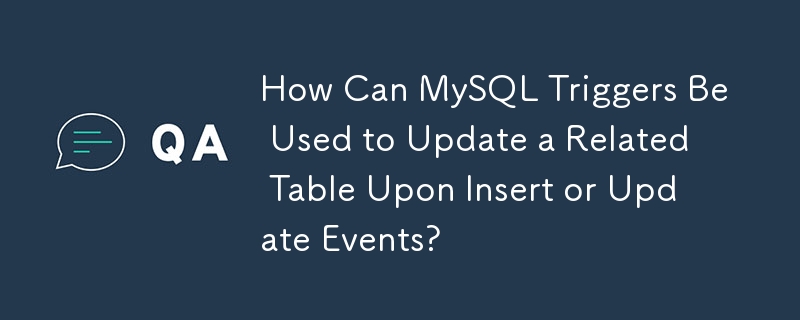Home >Database >Mysql Tutorial >How Can MySQL Triggers Be Used to Update a Related Table Upon Insert or Update Events?
How Can MySQL Triggers Be Used to Update a Related Table Upon Insert or Update Events?
- Patricia ArquetteOriginal
- 2024-11-13 04:18:02495browse

Using MySQL Triggers to Handle Insert and Update Events
To address the need for updating a related table ("ext_words_count") upon insert or update of a primary table ("ext_words"), MySQL triggers can be employed.
Understanding the Problem
The objective is to create a trigger that does the following:
- Updates "ext_words_count.count" when "ext_words.word" is updated.
- Inserts a record into "ext_words_count" if "ext_words.word" does not exist, setting "count" to 1.
Previous Attempts and Conditional Statements
The provided trigger attempted to update "word_count" using:
UPDATE ext_words_count SET word_count = word_count + 1 WHERE word = NEW.word;
However, this query only updates existing records and fails to handle insertions.
To address this, conditional statements can be used within the trigger. For instance, the following checks for the existence of a record in "ext_words_count":
IF NOT EXISTS (SELECT 1 FROM ext_words_count WHERE word = NEW.word)
Based on this condition, the trigger can execute either an insert or an update operation as needed.
Single Trigger for Both Insert and Update
Using conditional statements, a single trigger can be created to handle both insert and update events:
CREATE TRIGGER update_count AFTER INSERT ON ext_words
FOR EACH ROW
BEGIN
IF NOT EXISTS (SELECT 1 FROM ext_words_count WHERE word = NEW.word) THEN
INSERT INTO ext_words_count (word) VALUES (NEW.word);
ELSE
UPDATE ext_words_count SET word_count = word_count + 1 WHERE word = NEW.word;
END IF;
END
Inserting and Updating
Now, upon insertion or update of "ext_words", this trigger ensures that "ext_words_count" gets updated or inserted as required. Testing confirms that both scenarios are handled correctly.
The above is the detailed content of How Can MySQL Triggers Be Used to Update a Related Table Upon Insert or Update Events?. For more information, please follow other related articles on the PHP Chinese website!

